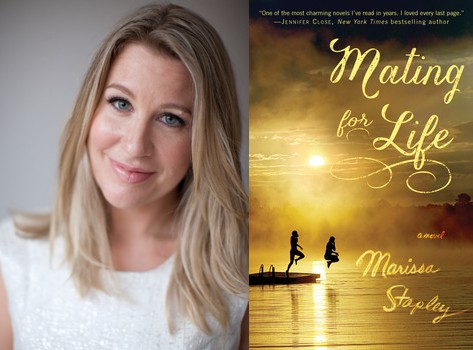In Mating for Life, a group of women whose connections range from maternal to circumstantial are captured in distinct moments of transition, unable to see the forest for the trees. These are the periods you look back on with gratitude for the growth they inspired, and Marissa Stapley renders them with a deft empathy for her characters. In each of the women, you will see something of yourself.
The mother is Helen; she was a famous Yorkville folk singer in the 70s, and each of her three daughters is the result of a different love affair. The first led to uptight, unhappily-married Fiona, a housewife who no longer finds satisfaction in the life she controls with meticulous necessity. The second led to Ilsa, an artist who is married to Fiona’s husband’s best friend and business-partner but might not really be well-suited to monogamy after all (the union is made all the more tense by the fact that the two sisters do not get along). The third to Liane, who is finishing her thesis and looking out at a good-on-paper life that has her feeling trapped. Each girl is in a different stage of trying to attain what their mother never had while simultaneously chafing against it. Meanwhile, Helen has met someone who has her rethinking her own view of relationships. The women converge every year at Helen’s island cottage. The stories in the book branch out from the four women in Helen’s clan.
The dynamics between the characters highlight the strange nature of some female relationships: The inability to admit to and share that unhappiness with those closest to you who are, unbeknownst to you due to their own reticence, feeling exactly the same way. But they also serve to remind that the superficial picture of someone’s story, the one you get visiting the marina where they work or attending the same annual summer parties, is never the full story.
It is a strange thing to immerse oneself in that very common unhappiness caused by nothing grand at all; unhappiness that is the river which grows from the streams that begin in making choices that are untrue to ourselves (a person we might not yet know). But that unhappiness also leads to the most compelling changes in oneself and one’s relationships. The book unfolds with quiet turns that you never quite see coming, and each of the characters is compelling and alive. Stapley has created a summer read that is difficult to put down, and you’ll feel compelled to talk about.
To celebrate the launch, join us at Junction Reads at 3030 on June 29th for a reading from the novel! Get all the deets HERE!



 Follow Us On Instagram
Follow Us On Instagram
